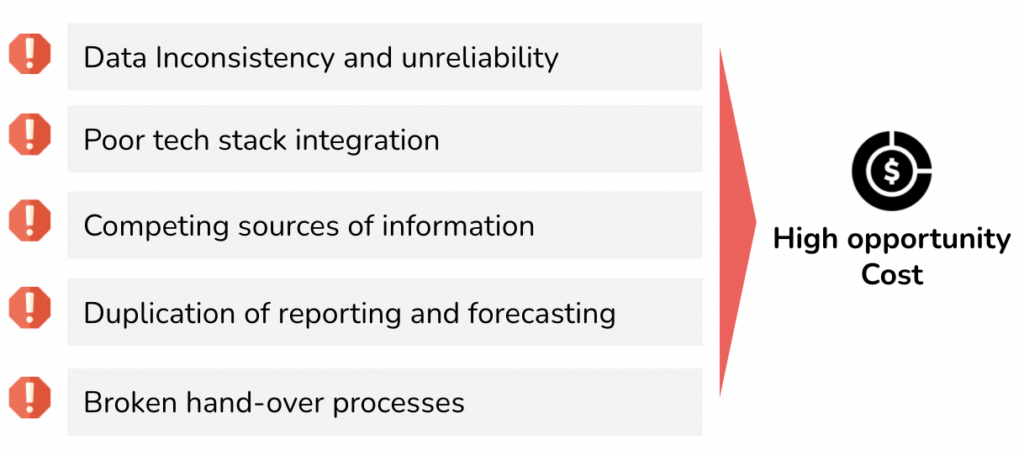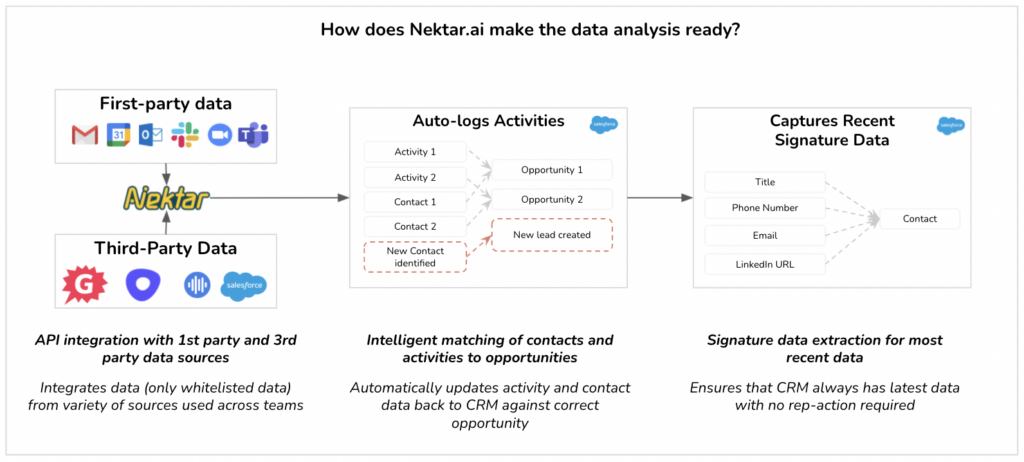
Siloed data across revenue teams hinder revenue growth
Breaking Down Silos: How Data Integration Across Revenue Teams Can Accelerate Revenue Growth.
In most companies data is organized at a team level and one team cannot access the data or sources of the other team. For example, the marketing team gathers the intent data for a prospect based on the marketing campaigns they run, while the sales team captures the data on how this prospect is transformed into a sales qualified lead to finally a customer. This entire customer journey data is not just broken down stages, but by teams as well. As per a recent study by Forrester, 73% respondents suggested fragmented use of CRM in their companies and 50% cited that since not all teams use the same CRM system, they cannot share information easily across teams.
This problem is only getting bigger as all revenue teams are increasingly adding more point solutions (300% up in 2 years) to their tech stack leading to too many distractions and too few signals.
As per another Forrester study, 72% of companies said managing multiple CRM systems across geographies / technology silos is moderately to extremely challenging, leading to accountability gaps, missed revenue opportunities, and negative customer experience.
“Given these days not one team is responsible for driving revenue, there is no place for siloed thinking. Sales leaders and Revenue Operations teams will have to provide a single, centralized and unified view of prospect, which is accessible, available, and actionable to all revenue teams.”
Why should companies eliminate data silos?

If you can’t measure your customer journey, you can’t optimize it. Simple!
Hence, the cost of not unifying data is high – these are not direct costs, but indirect costs.
- The time wasted on struggling with data silos, manually adding data, or aligning with teams means less time for revenue-generating activities like selling. To put this in perspective, I have tried to estimate a dollar impact. Field reps typically spend 17% of their time on gathering and updating data onto CRM. Assuming that on an average field sales rep is paid $100K a year, translates into an opportunity cost of $17K /rep/year.
- Additionally, 22% sales professionals cited that “Information gaps between different GTM functions (Marketing, SDRs, AEs) leading to lost insight” is the key reason for them to lose a deal – based on a new study conducted by Nektar.ai (N=134). In this case, company’s TCV becomes the opportunity cost for them.
- As per IDC study, companies lose 20-30% in revenue every year due to inefficiencies such as using incomplete data or old data for decision making
- As per Gartner study, taking decisions based on old or incomplete data could cost small to mid-sized businesses an average of $15 million per year in losses
Democratize your data using AI
Manually pulling data and assembling reports is predictably time-consuming – even impossible in some cases. Hence, around the world, AI is intensifying the race to unify your siloed customer data and extract valuable hidden insights for a more meaningful customer relationship. Thereby, helping sales leaders gain predictive insight into the future of their businesses.
Nektar.ai GTM data platform is purpose built for growing sales teams to unify all the data into one central data platform. We integrate and capture information from across the sources and intelligently write it back to your CRM, making it your source of record, so that you don’t have to lift a finger.
Nektar ends up becoming a system of intelligence on top of this collected data to surface actionable alerts and insights on pipeline risks, deviations against organization’s best practices, depth and strength of seller relationship within buyer committee etc.
We are on a mission to enable modern and distributed B2B sales teams to:
- Build for scale
- Differentiate GTM strategy
- Drive customer growth
- Make current tech stack work smarter
- Improve reporting and attribution insights
- Help teams stay productive

To know more, reach out to us at – [email protected]
PUBLISHED BY






